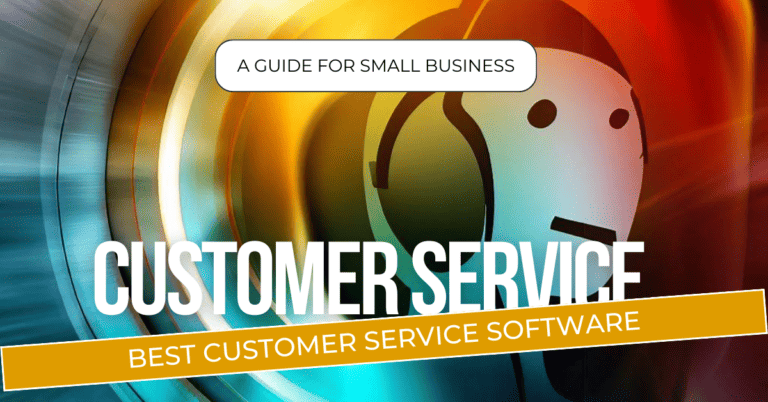Boosting Business Success with Cloud Based CRM
Entering the world of cloud based CRM can seem like a complex task, especially when you’re new to this technology.
Browsing through tech forums and LinkedIn posts, it’s common to see people overwhelmed by the vast number of options available and how they should be implemented in their businesses.
“You need experience with cloud-based systems to effectively use them.”
This is a misconception. Many companies are successfully leveraging cloud based CRM without prior extensive knowledge or experience.
So what makes these solutions so accessible?
Table of Contents:
- Embracing the Power of Cloud-Based CRM
- The Multifaceted Role of Web-Based CRM Software
- Unpacking the Benefits of Cloud-Based CRM Solutions
- Choosing Your Ideal Cloud-Based CRM Provider
- The Future of Cloud-Based CRMs
- A Closer Look at Some Top-Rated Systems
- Diversifying Your Options: Less Annoying CRM & Apptivo
- FAQs in Relation to Cloud Based Crm
- Conclusion
Embracing the Power of Cloud-Based CRM
The business world is witnessing a surge in cloud-based CRM systems. This internet-dependent technology has become an essential asset for companies aiming to handle their customer data more effectively and simplify sales processes.
When contrasted with on-premise CRMs, cloud-based alternatives offer several distinct benefits. Cloud-based CRMs are more straightforward to configure, need less upkeep over the long haul, and incorporate standard refreshes that keep your framework cutting-edge.
Moving Beyond On-Premise Solutions: The Case for Cloud-Based CRMs
An on-premise solution typically demands substantial initial investment in hardware infrastructure and software licenses. It also comes along with ongoing costs related to maintenance as well as potential downtime during upgrades or repairs.
A cloud-based alternative eliminates these concerns by providing all necessary resources remotely through a service provider’s servers – no hefty upfront costs or constant upkeep needed. Instead, you pay an affordable monthly subscription fee that gives you access to cutting-edge features designed specifically for managing customer relationships efficiently.
Data-Driven Decisions: Leveraging Customer Data Through Cloud-Based CRMs
In today’s competitive landscape, having deep insights into customers’ behaviors can be invaluable when it comes to strategizing marketing campaigns and improving product offerings based on specific consumer needs identified through analysis. A robust web CRM platform allows businesses not only to store vast amounts of client information but also to analyze this data using built-in analytics tools, making it possible to develop personalized strategies that cater to the unique preferences of each individual user group.
Sales Process Simplified: Efficacy Streamlining Sales Processes Web-Based CRMs
The Multifaceted Role of Web-Based CRM Software
Web-based CRM software has carved out a niche for itself in the modern business landscape. Cloud-based CRM software has become a key component for companies aiming to streamline their processes and amplify productivity.
Boosting Sales with Cloud-Based CRM
A standout feature of cloud-based CRMs is how they enhance sales pipeline management. By offering systematic tracking of leads, customer interactions, and deal progression, these systems empower businesses to close deals more swiftly.
Beyond simplifying sales processes, web-based CRM software also integrates seamlessly with other tools like Microsoft Outlook or Google Calendar. These integration capabilities pave the way for smooth workflow automation that saves time and minimizes errors.
Promoting Team Collaboration through Task Management
An important aspect where web-based CRMs shine is promoting team collaboration. They provide a unified platform where teams can share information, delegate tasks, monitor progress, and coordinate efforts towards achieving common objectives.
Emphasizing task management ensures alignment among all members on project goals and deadlines. It eliminates confusion by keeping everyone updated about changes or new developments within projects.
Contact Management across Multiple Channels
Contact management forms another crucial function facilitated by web-based CRM systems. They enable companies to consolidate contact details from various channels into one accessible location – be it email addresses from marketing campaigns or phone numbers from customer inquiries.
This consolidation facilitates easy tracking of communication history with each client, which ultimately enhances relationships and improves quality service delivery.
Leveraging Marketing Automation For Lead Generation
Incorporating marketing automation via your web-based CRM software extends its usage beyond mere organizational functions. With this feature, businesses are equipped to set up automated email marketing campaigns tailored specifically towards distinct segments in their audience base, resulting in a significant enhancement in lead generation initiatives.
All things considered, the diverse roles played by this technology not only simplify internal processes but optimize external engagements
Web-based CRM software is a game-changer in today’s business landscape, streamlining operations and boosting efficiency. It enhances sales pipeline management, fosters team collaboration through task management, consolidates contact details across channels for improved service delivery, and leverages marketing automation to boost lead generation. In short: it’s your secret weapon for internal process optimization and external engagement enhancement.
Unpacking the Benefits of Cloud-Based CRM Solutions
The shift to cloud-based CRM solutions has drastically transformed how businesses manage their customer relationships. These tools enable companies to gain real-time insights into customer behaviors and preferences, which paves the way for a more personalized service delivery.
A standout advantage is that teams can access data from anywhere at any time. Accessing up-to-date customer data from anywhere at any time not only boosts productivity, but also helps to deliver a more personalized service.
Cost-Effectiveness of Cloud-Based CRMs
Besides improving efficiency and enhancing user experiences, cloud-based CRM systems offer significant financial benefits too. Contrary to traditional systems requiring big sums for setup and maintenance, these platforms operate under a pay-as-you-go subscription model.
This approach significantly reduces upfront costs as there’s no need for hefty investments in expensive hardware or software licenses. Moreover, updates are managed by providers over the internet, saving businesses from ongoing maintenance expenses.
In essence, this pricing structure allows organizations to scale usage according to demand without worrying about excessive resource allocation or large capital investments—particularly beneficial for small enterprises with tight budgets. Salesforce
Data Security Measures in Place
Moving operations onto a cloud platform raises valid concerns around data security issues. However, reputable providers implement robust measures to protect your information against unauthorized access or loss due to system failure.
Their commitment extends beyond merely safeguarding user data; they work tirelessly towards maintaining system integrity so you can focus solely on growing your business instead of fretting over potential breaches or downtime incidents. Less Annoying CRM, Apptivo
Choosing Your Ideal Cloud-Based CRM Provider
Deciding on a cloud-based Customer Relationship Management (CRM) supplier is an important decision for companies. The market is flooded with options, but your choice should ultimately hinge on the flexibility of the solution to cater to your unique business needs.
ZohoCRM: A Flexible and Robust Option
In the sea of CRM providers, ZohoCRM stands out as one of the top-rated choices. It offers an impressive data recovery plan that safeguards your precious customer information against unforeseen circumstances or disasters.
Beyond just security measures, ZohoCRM goes above and beyond in enhancing customer experiences by incorporating advanced modules like artificial intelligence into their system. This technology can predict consumer behavior patterns, allowing you to deliver personalized service based on individual preferences.
The Appeal of HubSpot’s Free Version
If budget constraints are a concern for your small business yet you still want to harness the power of a robust CRM software, consider starting with HubSpot’s free version. With this option at hand, there’s zero financial commitment involved while gaining access to essential features such as contact management and email marketing capabilities.
This complimentary version provides ample opportunity for smaller enterprises exploring how using a CRM could potentially improve operations before deciding whether they’re ready for more comprehensive packages offered by other vendors like ZohoCRM.
Making An Informed Decision For Your Business Needs
When it comes down to choosing between different providers offering similar services, it becomes crucial not only to look at cost but also at what each platform specifically brings to the table according to your requirements. Each has its own strengths depending upon factors like scalability, user interface, integration capabilities, etc. Therefore, understanding these aspects will help make informed decisions when selecting an ideal cloud-based CRM provider.
As we transition towards discussing future trends shaping the landscape of CRMs, let us delve deeper into increased mobile app usage enabling sales reps to conduct calls on the go, along with advanced AI capabilities improving data safety, further adding value proposition and overall effectiveness of these tools.
Choosing a cloud-based CRM provider is a critical business decision. ZohoCRM and HubSpot’s free version are top contenders, offering advanced features like AI modules and email marketing capabilities respectively. Remember, the best choice hinges on your unique needs – from scalability to integration capabilities.
The Future of Cloud-Based CRMs
As the digital sphere develops, so too does the realm of cloud-based CRM solutions. A key trend we’re seeing is sales reps increasingly turning to mobile apps for managing customer relationships on the go.
This mobility isn’t just about convenience—it’s a game-changer in terms of productivity and efficiency.
Sales reps can now make calls, update information, and manage their tasks from anywhere at any time. This means opportunities are less likely to slip through due to delays or miscommunication issues that might arise when confined within traditional office boundaries.
Making Business Mobile with Apps
Beyond communication benefits, these mobile apps also integrate seamlessly with other business tools used daily by companies. These integrations enable smooth transitions between different tasks without losing valuable progress or context—essentially creating an integrated workspace right within your pocket.
A study conducted by Nucleus Research found that providing access via a mobile app increases ROI for CRM solutions significantly more than its desktop-only counterpart.
Data Safety: Securing The Digital Age
An equally important development shaping the future of cloud-based CRMs revolves around data safety concerns as businesses store increasing amounts of sensitive customer information online. In response, providers are upping their security measures using advanced AI capabilities specifically designed for this purpose.
Uses predictive analytics technology which helps identify unusual activity patterns indicative potential breach attempts.
Moreover, such advancements not only help detect threats early but also ensure compliance with stringent international privacy laws like GDPR.
It becomes clear why modern businesses continue gravitating towards cloud-based CRMs – they offer an enhanced user experience while ensuring maximum security.
Next up let us delve deeper into some top-rated systems Salesforce, Less Annoying CRM, Apptivo – comparing offerings pricing standard plan vs basic plan features unlimited data storage email templates availability. Stay tuned.
Cloud-based CRM systems are evolving with the digital landscape, offering mobile apps for on-the-go customer management. These tools boost productivity and integrate seamlessly with other business applications. With enhanced security measures in place to protect sensitive data, cloud-based CRMs are becoming an increasingly popular choice among modern businesses.
A Closer Look at Some Top-Rated Systems
Let’s delve into the world of top-rated cloud-based CRM systems, starting with Salesforce, a renowned name in this sphere. Salesforce is lauded for its extensive range of features and robust capabilities that make it an industry leader.
Salesforce: A Comprehensive Solution
Salesforce offers diverse functionalities catering to various business needs. It covers everything from sales management to customer service and marketing automation, providing tools designed to enhance productivity and streamline operations.
The pricing model adopted by Salesforce is tiered – you start with a basic plan offering essential features like account contact management and opportunity tracking. As you ascend the tiers, more advanced options such as custom report types become available along with collaborative forecasting opportunities and unlimited online training resources.
Data storage is another key aspect when considering any CRM system. With higher-tier plans on Salesforce offering unlimited data storage capacity, it stands out amongst many competitors who often limit their data or charge additional fees for extra storage space.
Email templates are integral components within any effective CRM strategy; they save time by automating repetitive tasks while ensuring consistency across all communication channels.
Email Templates Availability in Salesforce
In line with expectations, Salesforce comes equipped with pre-designed email templates ready for customization according to specific campaign requirements or personal preferences. This feature allows businesses to maintain brand consistency while speeding up outreach efforts.
Diversifying Your Options: Less Annoying CRM & Apptivo
Less Annoying CRM lives up to its name by aiming to provide simple yet efficient solutions without overcomplicating things like some other platforms might do.
LACRM: Simplified Approach To Cloud-Based CRMs
LACRM’s straightforward pricing – one flat rate per user per month which includes full access to all its features, free updates, and support services – makes it quite appealing, especially for small-scale businesses operating under tight budgets. Moving onto Apptivo, a platform that caters well towards growing companies looking for
Cloud-based CRM systems like Salesforce, Less Annoying CRM and Apptivo offer diverse functionalities tailored to various business needs. From sales management to customer service, these platforms provide tools designed for productivity enhancement and operational streamlining. With tiered pricing models and features such as unlimited data storage and customizable email templates, businesses can effectively manage their resources while maintaining brand consistency.
FAQs in Relation to Cloud Based Crm
What are the benefits of cloud-based CRM?
Cloud-based CRM offers real-time insights, automates critical processes for better customer service, and provides cost-effective solutions with pay-as-you-go models.
What is the difference between cloud CRM and mobile CRM?
While both are accessible remotely, cloud CRMs store data online, while mobile CRMs are specifically designed for handheld devices like smartphones or tablets.
Is Salesforce a cloud-based CRM?
Yes, Salesforce is a leading provider of cloud-based CRM solutions, offering diverse features from sales automation to customer service tools.
Is AWS a CRM platform?
No, Amazon Web Services (AWS) isn’t a dedicated CRM platform, but it hosts various third-party CRMs on its robust infrastructure.
Conclusion
Cloud-based CRM is the future of customer relationship management.
It’s not just a mere instrument, but rather an entire system that helps organizations optimize their activities and expand deals.
The multifaceted role it plays in team collaboration, task management, contact management, and marketing automation can’t be overlooked.
Its benefits are manifold – from providing real-time insights to automating critical processes for superior customer service. And let’s not forget its cost-effectiveness with pay-as-you-go subscription models!
Picking the right provider could mean unlocking new levels of efficiency for your business. Whether you’re considering AgileCRM or ZohoCRM or even exploring HubSpot’s free version – there’s something out there tailored to your unique needs.
The future looks promising too! With increased mobile app usage and advanced AI capabilities on the horizon, cloud-based CRMs will continue to revolutionize how we do business.
If you’re ready to take your business success up a notch by leveraging cloud-based CRM systems and want more insights into my 35 years of experience in customer service along with tips on how software innovation can generate more leads for your venture, visit Chrisvassiliou.com





